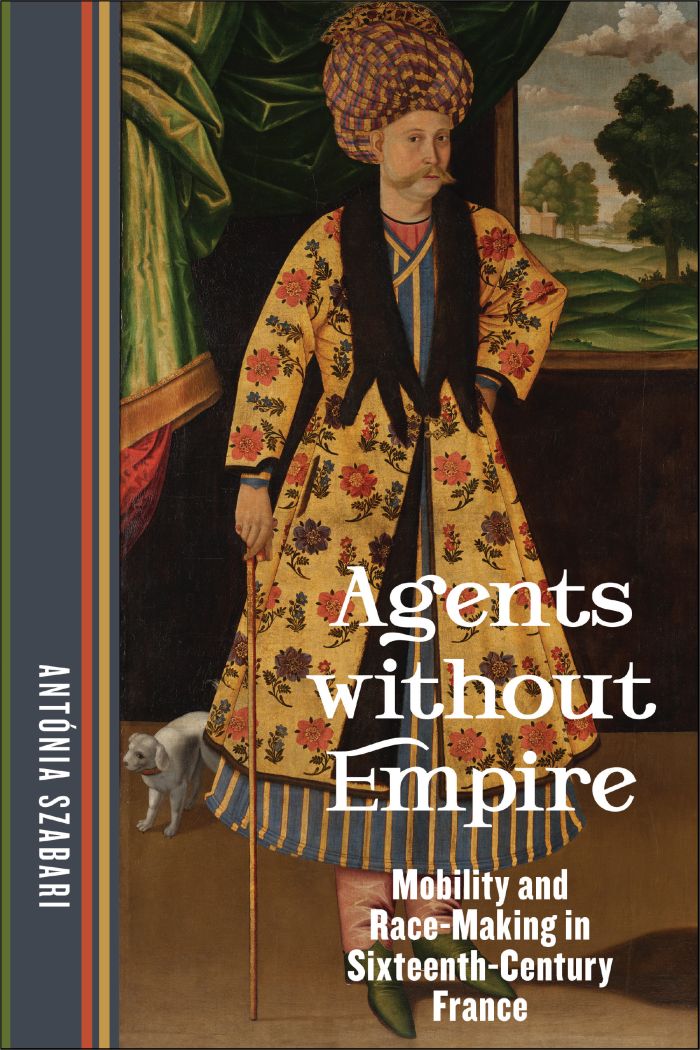Agents without Empire
Mobility and Race-Making in Sixteenth-Century France

This book can be opened with

HONORABLE MENTION, SCAGLIONE PRIZE FOR FRENCH AND FRANCOPHONE STUDIES, MODERN LANGUAGE ASSOCIATION
It is well known that Renaissance culture gave an empowering role to the individual and thereby to agency. But how does race factor into this culture of empowerment? Canonical French authors like Rabelais and Montaigne have been celebrated for their flexible worldviews and interest in the difference of non-French cultures both inside and outside of Europe. As a result, this period in French cultural history has come to be valued as an exceptional era of cultural opening toward others. Agents without Empire shows that such a celebration is, at the very least, problematic.
Szabari argues that before the rise of the French colonial empire, medieval categories of race based on the redemption story were recast through accounts of the Ottoman Empire that were made accessible, in a sudden and unprecedented manner, to agents of the French crown. Spying performed by Frenchmen in the Ottoman Empire in the sixteenth century permeated French culture in large part because those who spied also worked as knowledge producers, propagandists, and artists. The practice changed what it meant to be cultured and elite by creating new avenues of race- and gender-specific consumption for French and European men that affected all areas of sophisticated culture including literature, politics, prints, dressing, personal hygiene, and leisure.
Agents without Empire explores race making in this period of European history in the context of diplomatic reposts, travel accounts, natural history, propaganda, religious literature, poetry, theater, fiction, and cheap print. It intervenes in conversations in whiteness studies, race theory, theories of agency and matter, and the history of diplomacy and spying to offer a new account of race making in early modern Europe.
An admirable work of scholarship. Agents without Empire offers a multidimensional account of the construction of race in early modern France by addressing how French authors navigate the boundaries of the human.—Rebecca Zorach, Northwestern University
Szabari’s book will be a welcome addition to early modern studies and will help scholars of race, nation, gender, and early modernity reconsider the very concept of agency.—Todd Reeser, University of Pittsburgh
Alongside the work of scholars involved in RaceB4Race, still largely the domain of scholars working on Anglophone material, Szabari looks to expand our ways of reading race in the French sixteenth century…—Katherine Ibbett, H-France Forum
In positing a Mediterranean prehistory to New World racialization, Agents without Empire enables us to see the development of early modern French race-making in its true, wider perspective, as a historical phenomenon that develops on an East-West axis linking the Mediterranean to the Atlantic.—Toby Eric Wikström, H-France Forum
As Szabari convincingly demonstrates, early modern French encounters with other civilizations, old and new, always already entail colonial ambitions and a sense of cultural superiority. . . Not unlike the works of Renaissance humanists, the book engages with a plethora of topics and questions and is written by a twenty-first-century polymath, indulging the reader in the breadth and depth of her erudition. The appetite for the world is a recurring theme in Agents without Empire. It is paralleled by Szabari’s own appetite for the rich culture of the Renaissance of which she makes ample use in all its variety throughout the book to construct her argument.—Marcus Keller, H-France Forum
Fascinating and perceptive, Agents without Empire is a profoundly engaging book that calls readers to think in the most capacious way possible about how the premodern body negotiates agency, including its integrity and its humors, its constitution and health, its hue, representation, and coloring, its contours and its form. It ultimately suggests that a percipience of the varying porosity, malleability, and movement of the body not only helps inform or determine its literary, dramatic, and iconographic currency, but helps parse the anxieties of the agential self in its struggle to create, constitute, and assert itself in sixteenth-century France.—Alani Hicks-Bartlett, H-France Forum
Preface | ix
Introduction: French Agents in the Ottoman Empire | 1
1 Big Appetite and Rabelais’s Multiracial Empires | 29
2 Bird-Man 2, Female Androgyne, and Other Speculative Transformations | 60
3 Snake Women of the East: Staging Freedom and Invisible Unfreedoms | 89
4 Nicolas de Nicolay’s Empire of Ink | 121
5 Distancology and Universalizing French Masculinity | 160
Coda: Race and Self-Discovery | 189
Acknowledgments | 197
Notes | 199
Works Cited | 249
Index | 269




